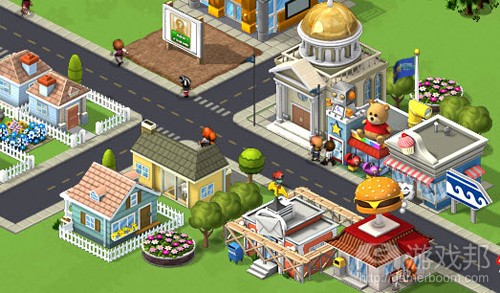Facebook游戏对玩家是否还有价值?
作者:tobold
昨天有人提出了一个有趣的问题:“你现在是否还认为Facebook对玩家还有价值?如果在此你的隐私权得到了保障,你是否愿意再申请另外一个帐号?”答案是肯定的。以下我将详细为你解答原因:
首先你应该摒弃脑中那个固执的想法,即“Facebook游戏”都是类似于《FarmVille》的游戏。将Facebook的所有游戏等同于《FarmVille》就像是将所有电脑游戏等同于《Solitaire》这种纸牌游戏一样。Facebook游戏也有好坏之分。在不同玩家眼中,有的游戏是“优秀的”,有的游戏是“糟糕的”。对于我们来说非常“糟糕的”Facebook游戏,可能对于其他人而言是非常有趣的。我认识的一位女性因为觉得《魔兽世界》太困难而抱怨连连,但是在《CityVille》中她却能够发挥自如,而我对于这款游戏实在是欠缺兴趣。
因为Facebook的目标用户通常是一些不常玩游戏的玩家,如果在Facebook能够找到一款游戏是迎合资深玩家的喜好,那么这真的可称得上是一款“精华”游戏。也许在Facebook游戏中也有一些向导,但是我却从来没有找到。很多网站评价Facebook游戏的标准都是它们成百上千万的玩家数量。而这些游戏都是一些比较简单的游戏,适合玩家们在午休时间体验。虽然不能如此就评判这些游戏很“糟糕”,但是对于铁杆硬核玩家来说这些游戏却是不适合的。
第二大警告是另外一个问题,即“如果隐私权能够得到保障。”但是在Facebook上玩家的隐私权很难得到保障。在Facebook上玩家可以用自己的真实姓名与真正的好友一起玩游戏,但是这么做却存在着很多弊端,除非玩家真正的好友都是Facebook游戏的粉丝。Facebook游戏经常会衍生出许多垃圾邮件,而因此暴露你是Facebook玩家的身份。而且大多数Facebook游戏都具有社交性,你需要与好友相互协作才能继续前进。或者你也可以选择花大把钱去购买道具而不用开口向好友索求。
现在对于很多人来说,正是Facebook游戏的这种“社交”功能让游戏的价值越来越不足为道了。这已经是一个可以理解且相对有效的观点了。但是作为一名游戏分析家,我想要就游戏设置和商业模式进一步分析。这就好比是电脑游戏花费一百万美元去购买版权:虽然这么做对于游戏是有帮助的,但是这个高额成本却让很多人招架不住。如果玩家用真名去申请Facebook帐号,而且在Facebook中所关注的好友都是所认识或者与之相关的人,那么他们可能会因为不能接受高额的社交成本而放弃一款好游戏,这也是为何我使用假名与一些不认识的“好友”相互发送垃圾邮件而被Facebook禁止的原因。基本上我不会为Facebook游戏支付这种社交成本,但是Facebook却不让我这么做。
现在也有一些Facebook游戏开始摒弃“垃圾邮件或者付费购买”的商业模式了。而且如果你设置了资料只对好友公开,那么你便能够更好地保护自己的隐私,不让陌生人轻易了解你的游戏行为,而这时你便可以更好地玩Facebook游戏了。不同的游戏需要你投入不同的社交成本,而如果你真心愿意为此付费,那么你就需要去寻找一些值得你花钱的好游戏。千万不要盲目地陷进游戏中,以免发生在上班时间要求你的老板帮忙点击奶牛的情况。(本文为游戏邦/gamerboom.com编译,拒绝任何不保留版权的转载,如需转载请联系:游戏邦)
The value of Facebook games
Stabs asked an interesting question yesterday: “Do you think Facebook has any value to gamers now? Would you get another account if privacy were not an issue?” The short answers are yes, and yes. But as that makes a boring blog post, let me give you the long answer too:
First of all you need to get the idea out of your head that there is only one sort of “Facebook Game”, and that it is somewhat similar to Farmville. Judging all games on Facebook based on Farmville makes about as much sense as judging all PC games based on the most-played PC game of all times, which is probably Solitaire. There are good and bad Facebook games out there. And then this is “good” and “bad” when viewed with the eyes of a “gamer”. A lot of Facebook games which are “bad” to me and you, aren’t necessarily “bad” to everybody. I know a woman who is playing a bit of World of Warcraft, but finds WoW very hard. But she rules in Cityville, a game I found far too boring.
Because the target audience for Facebook games is often people who do not otherwise play games, finding a game on Facebook which is “good” for veteran gamers means sorting through a lot of dross. Maybe there is a guide somewhere out there, but I haven’t stumbled upon one yet. Most sites discussing Facebook games just list popularity by millions of players. And that strongly favors the least complicated games, which are played by non-gamers in their lunch break. That doesn’t necessarily make the “bad” games, but it makes them unsuitable for the likes of you and me. It also creates a vicious cycle for game companies: Zynga recently published a game which was more complicated and more interesting to gamers than their usual fare, and the game promptly tanked.
The second major caveat is Stabs’ limitation of “if privacy were not an issue”. Privacy *is* an issue on Facebook. Playing most games on Facebook under your real name with your real friends has serious drawbacks, unless your real friends are *all* Facebook games fans. Facebook games produce a lot of spam, clearly “outing” you as a gamer on Facebook. And many Facebook games are “social” in that you need your friends to cooperate to advance. Or pay crazy amounts of money to replace the “free gifts” your friends could send you.
Now for many people this “social” feature of many Facebook games makes Facebook games not worth playing. That is a totally understandable and valid point of view. But as a game analyst, I tend to separate game play and business model. That is basically the same thing as whether a hypothetical PC game costing 1 million dollars to buy a copy of is any good: The game might well be very good, but the cost is unacceptable to most of us. If you have a real name Facebook account on which the friends are your real friends and relatives, you might very well decide to skip a good game because the social cost of having to spam your real friends to advance is unacceptable to you. It sure is unacceptable to me, which is why I got banned for having a false name account and lots of fake friends with which I had a kind of mutual spamming acceptance deal. I basically refused to pay the social cost of Facebook games, and Facebook banned me for it. It might even have been my blog posts about this possibility to avoid the social cost that led Facebook to ban me.
Now Facebook does have some games which aren’t using a “spam friends or pay big bucks” business model. And if you have only friends who already know that you are an avid gamer, and your profile has all the privacy settings correctly set to protect you from people you don’t want to know about your gaming habit, then you could play Facebook games. Different games have different amounts of social cost, and if you are willing to pay that social cost, there are some good games to be found. Just don’t dive in without thinking and end up sending your boss a request to help you click on a cow during work hours.(source:tobolds.blogspot)









































